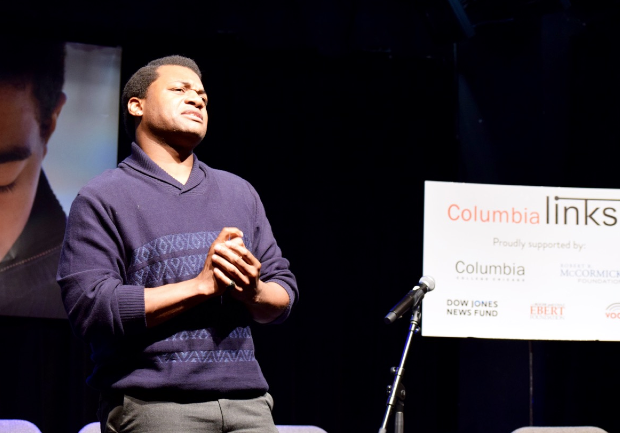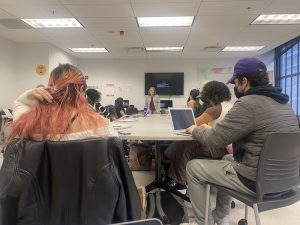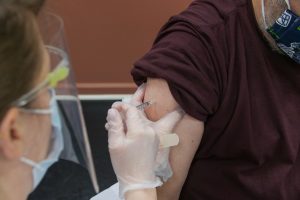As a child, Kelvin Roston Jr. never invited any friends over to his house. He wasn’t anti-social and he had friends, but his mother had a mental illness and he wasn’t sure how guests would react to her.
Beyond the feelings of others, Roston didn’t know how to navigate his own feelings about his mother.
“We don’t put [mental health] in the same bag as other illnesses, like cancer,” Roston said. “We socially accept someone suffering from cancer, but with mental illness it’s a different reaction.”
Roston, now an accomplished stage actor and musician, opened the Nov. 5 Columbia Links Town Hall on adolescent mental health. Roston, Five Chicago high school students, members of the Links I-team, and four adult experts explored problems and solutions to these complex issues.
More than 100 people gathered at Columbia College’s Music Center to hear results from the teens’ in-depth reporting for a 35-page white paper for the project “On The Edge: Undiagnosed and Untreated.”
The youth reporters wrote articles covering a range of mental-health related issues such as Chicago Public School’s mental-health policies, the intersection of religion and mental health, the ease with which students buy ADHD medicine from those who have prescriptions, and the under-utilization of mental-health services in minority communities.

Moderator Natalie Moore of Chicago Public Radio asked the students about their findings.
“People I interviewed said they’d rather talk to a religious figure than someone who’s professionally trained [as a mental health counselor],” said Brandon Spencer, a student at Urban Prep High School.
Christopher Griffin, a priest at St. Martin’s Episcopal Church on the city’s West Side, spoke about his realization that he needed both his theological training and professional mental health training to best serve his parishioners
“I bring a much needed bridge between my parishioners and mental health services they wouldn’t normally trust,” Griffin said.
“In the field of psychology, there is distrust of religious figures; I think ministry is still a safe space.”
Miwa Yasui, a professor of social work at the University of Chicago, said stigma permeates communities of color for a number of reasons related to economic and social inequities.
“People of color are not finding clinics with their background and cultural needs,” Yasui said. “Health providers need to go beyond diagnosis and think about the context people are in.”
Sgt. Dion Trotter, the director of the Cook County Child Protection Response Unit, said young people he encounters are dealing with such conditions as Post Traumatic Stress Disorder due to violence in their communities.
“Kids are getting high to get away from that,” he said.
Northside College Prep student Christian Thorsberg said more than 20 percent of adolescents in the United States live with some form of mental illness, which he based on research by the National Alliance on Mental Illness (NAMI).
In his reporting on Chicago Public Schools’ mental health policy, Thorsberg said the school district puts mental health “on the back burner.”
“There’s no real outlet for teens to go through, and counselors are overwhelmed,” Thorsberg said. “CPS feels that [the current] 1 to 500 student-to-counselor ratio is acceptable.
Kiersten Lofton, a student at Illinois Math and Science Academy, asked the panel of experts how teens can know whether they’ve been misdiagnosed with a mental illness, or received a faulty one, such as bipolar disorder rather than depression.
Multiple panelists agreed people should always seek a second opinion.
Yasui wants to see more providers forming partnerships with communities to reduce stigma and build trust where there has been “generational distrust.” She said conversations about diagnoses must include understanding a teen’s living situation.
Trotter said he has encountered kids who were prescribed drugs because they “couldn’t behave.”
“That becomes an addiction problem, which becomes a crime problem after they stop taking meds,” he said.
“Why is it that they have to be incarcerated to get help?”
 Roston shared a monologue and musical piece from Twisted Melodies. The play centers around musician Donny Hathaway’s experience living with schizophrenia while maintaining a public profile.
Roston shared a monologue and musical piece from Twisted Melodies. The play centers around musician Donny Hathaway’s experience living with schizophrenia while maintaining a public profile.
He said the play, presented by Congo Square Theater in August, has helped to combat stigma around mental illness and created an opening for people to share thoughts and experiences about their own struggles.
“People come up to me after the play and say their brother, or mom, or sister [displays symptoms of mental illness],” he said. “More people are dealing with it than we admit.”
Sgt. Trotter said beyond expansion of wrap-around services for people living with mental illness, there must be a deepening of the conversation on mental health.
“We have to come together like a family would on this issue,” he said.
“Once we become a family we can become a community.”













Be First to Comment